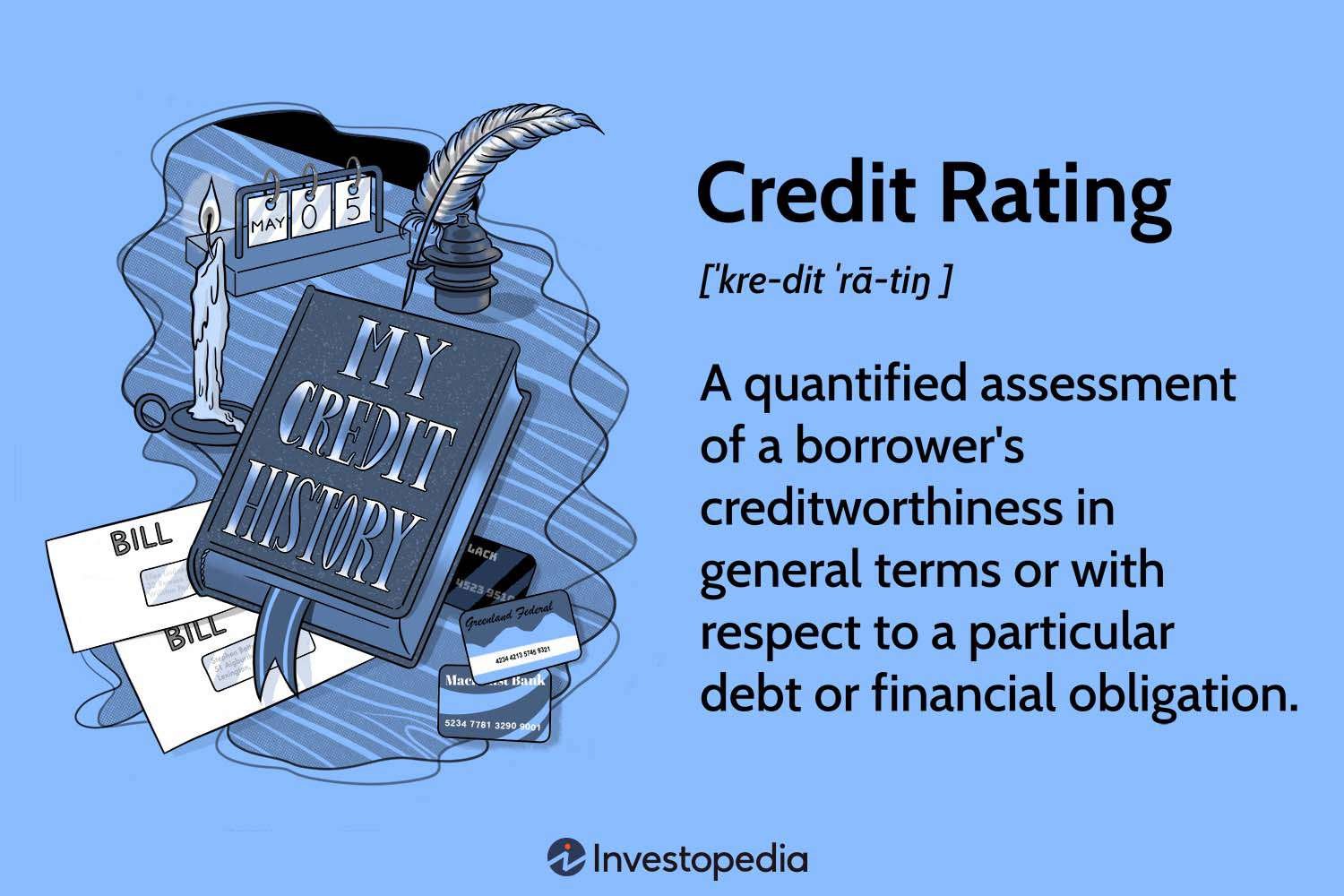A credit rating can make or break your financial opportunities. Understanding what a credit rating is and its importance is crucial for anyone navigating the world of loans, mortgages, and credit cards. Simply put, a credit rating assesses your creditworthiness and financial reliability as an individual or business. It determines the likelihood of you repaying borrowed money on time. In this blog article, we will dive into the significance of credit ratings and how they impact your financial future. So, let’s explore what a credit rating is and why it truly matters.
What is a Credit Rating and Its Importance
In today’s financial world, credit plays a vital role in our lives. It determines our ability to borrow money, secure loans, and even affects our job prospects in some cases. When it comes to credit, one important factor that lenders and financial institutions consider is your credit rating. But what exactly is a credit rating, and why is it so important? In this article, we will explore the ins and outs of credit ratings, their significance, and how they impact various aspects of our lives.
Understanding Credit Rating
A credit rating is a numerical representation of an individual’s or a business entity’s creditworthiness. It serves as an evaluation of the borrower’s ability to repay their debts and the likelihood of defaulting on future credit obligations. Credit ratings are typically assigned by credit rating agencies, independent organizations that assess and analyze financial data.
These agencies gather information about a person or business’s financial history, payment behavior, outstanding debts, and other relevant factors. Based on this information, they assign a credit rating, which can range from AAA (the highest) to D or F (the lowest).
The Importance of Credit Rating
Your credit rating plays a crucial role in various financial aspects of your life. Understanding its importance can help you make informed decisions about your borrowing and financial management practices. Here are some key reasons why credit ratings are significant:
1. Access to Credit
One of the primary reasons credit ratings are important is the access to credit they enable. A high credit rating signals to lenders that you are a reliable borrower who is likely to repay their debts on time. This makes it easier for you to secure loans, credit cards, and other forms of credit. On the other hand, a low credit rating may result in limited credit opportunities or higher interest rates.
2. Interest Rates
Credit ratings directly influence the interest rates you’re offered on loans and credit cards. Lenders use credit ratings as a risk assessment tool to determine the likelihood of default. Borrowers with higher credit ratings are considered less risky and are therefore offered lower interest rates. Conversely, individuals with lower credit ratings may face higher interest rates, as lenders aim to mitigate the increased risk they perceive.
3. Housing and Rental Options
When it comes to renting a property or applying for a mortgage, landlords and lenders often review credit ratings. A poor credit rating can make it difficult to secure a rental property or a favorable mortgage. Landlords and lenders view a low credit rating as a potential risk, affecting your chances of being approved for housing or favorable loan terms.
4. Employment Prospects
Believe it or not, your credit rating can even impact your job prospects in some industries. Certain employers, especially those in the financial sector, may review credit ratings as part of their hiring process. A low credit rating can raise concerns about an individual’s financial responsibility, potentially negatively affecting their chances of securing a job.
5. Insurance Premiums
Credit ratings also come into play when determining insurance premiums. Insurance companies often consider credit ratings when assessing the risk associated with the individual or the property being insured. A higher credit rating may result in lower premiums, while individuals with lower credit ratings may face higher insurance costs.
6. Business Opportunities
For businesses, credit ratings hold immense importance. A favorable credit rating enhances a company’s reputation and trustworthiness in the eyes of potential partners, suppliers, and lenders. It increases their chances of securing favorable business agreements, access to financing, and better trade terms.
7. Financial Planning and Future Goals
Lastly, credit ratings are a crucial tool for financial planning. Monitoring and maintaining a good credit rating can open doors to better financial opportunities and provide access to credit when needed. It allows individuals and businesses to plan for future goals, such as purchasing a home, starting a business, or pursuing higher education.
Factors Influencing Credit Ratings
Now that we understand the significance of credit ratings, let’s delve into the factors that influence them:
1. Payment History
Your payment history is one of the most crucial factors in determining your credit rating. Lenders want to see a consistent track record of timely payments on your existing and past credit obligations. Late payments, defaults, or bankruptcies can significantly lower your credit rating.
2. Credit Utilization
Credit utilization refers to the amount of available credit you are using at a given time. High credit utilization, where you are utilizing a large portion of your available credit, can negatively impact your credit rating. It is advisable to maintain a credit utilization ratio below 30% to maintain a good rating.
3. Length of Credit History
The length of your credit history also affects your credit rating. Lenders prefer borrowers with longer credit histories, as it provides a more comprehensive picture of their creditworthiness. In contrast, individuals with limited credit history may have lower credit ratings.
4. Credit Mix
The types of credit you have, such as credit cards, loans, or mortgages, also influence your credit rating. Having a diverse credit mix can have a positive impact on your credit rating, as it demonstrates your ability to handle different types of credit responsibly.
5. Recent Credit Applications
Applying for multiple credit accounts within a short period can raise concerns for lenders. It may indicate financial stress or a potential increase in debt burden. Such inquiries can slightly lower your credit rating, so it’s important to be cautious and strategic when applying for credit.
Monitoring and Improving Your Credit Rating
Now that you understand the importance of credit ratings and the factors influencing them, it’s crucial to monitor and actively work on improving your credit rating. Here are some tips to help you along the way:
- Regularly check your credit report to ensure its accuracy and identify any errors.
- Make payments on time and in full to establish a positive payment history.
- Keep your credit utilization ratio below 30% by managing your credit accounts responsibly.
- Avoid opening multiple new credit accounts within a short period.
- Consider using secured credit cards or becoming an authorized user to build or rebuild credit.
- Seek professional advice if you’re facing financial difficulties to avoid negative impacts on your credit rating.
By actively managing and improving your credit rating, you can enhance your financial well-being and open doors to better financial opportunities in the future.
Credit Ratings Explained : Why Is It Important For A Country? [ Animated ] | ThingsToKnow
Frequently Asked Questions
Frequently Asked Questions (FAQs)
What is a credit rating?
A credit rating is an evaluation of the creditworthiness of an individual, company, or country. It is a measure of the borrower’s ability to repay debt and the likelihood of defaulting on payments.
Why is credit rating important?
Credit rating is important because it helps lenders, investors, and financial institutions assess the risk associated with lending money or investing in a particular entity. It provides insights into the borrower’s financial stability and repayment capacity.
How is credit rating determined?
Credit rating is determined by credit rating agencies such as Standard & Poor’s, Moody’s, and Fitch Ratings. These agencies analyze various factors including financial statements, previous borrowing behavior, market conditions, and economic factors to assign a credit rating.
What are the different credit rating categories?
Credit rating categories generally range from AAA (highest rating) to D (default). Some agencies use additional symbols to provide more specific ratings within each category, such as ‘+’ or ‘-‘ signs to indicate relative standing within a category.
How does a good credit rating benefit individuals?
Having a good credit rating allows individuals to access loans, credit cards, and other forms of credit at favorable interest rates and terms. It also improves their chances of being approved for rental agreements, mortgages, and employment opportunities that involve financial trust.
What are the consequences of a poor credit rating?
A poor credit rating can make it difficult for individuals or companies to qualify for loans or credit. If approved, they may face higher interest rates, stricter terms, or the need for a co-signer. A poor credit rating can also limit access to housing, utilities, and job opportunities.
How can credit rating be improved?
To improve credit rating, individuals should make timely payments, reduce debt, and maintain a low credit utilization ratio. It is important to regularly check credit reports for errors and take steps to rectify them. Building a positive credit history over time will also contribute to an improved credit rating.
Can credit rating agencies make mistakes?
Yes, credit rating agencies can make mistakes in their evaluations. It is advisable to review credit reports regularly and report any errors to the agency for correction. Individuals can also provide additional information to credit agencies to help improve their credit rating.
Final Thoughts
In conclusion, understanding a credit rating and recognizing its importance is crucial. A credit rating is an assessment of an individual or company’s creditworthiness, determining their ability to repay debts. It helps lenders and investors evaluate the risk associated with lending money or investing in a particular entity. A credit rating provides crucial information that influences interest rates, loan approvals, investment decisions, and even insurance premiums. By considering a credit rating, individuals and companies can make informed financial choices, improve their financial standing, and access better opportunities for loans and investments. Mastering the concept of credit rating and its significance is a valuable skill for navigating the financial world.



